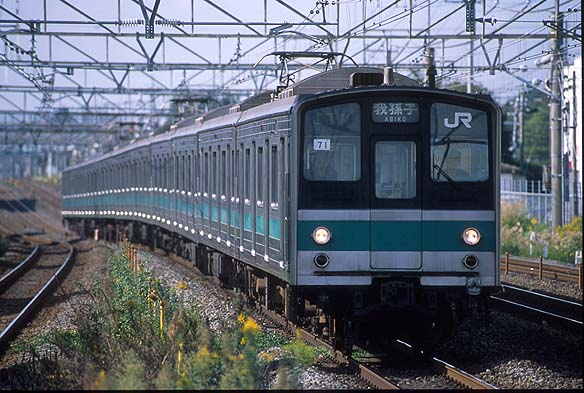Background and overview
Japanese National Railways (JNR) had examined to develop variable frequency
drive traction system for adoption by Hokuriku Shinkansen and got good
results in 1985. OPn the contrary, JNR made a plan to deliver another set
of 10-car formation for providing additional capacity of Johban ordinary
services at the time schedule revision on Oct., 1986. So, JNR decided to
developed new commuter DC electric multiple unit (EMU) trains, 207-900
series, employing Variable-frequency drive (VFD) traction system and delivered
in 1986.
Car body
They have 2800mm narrow body. Their body design incorporates stainless steel in order to realize lightweight body. End cars are equipped with an emergency door in front of them. Their skin of the bodies is not finished under no coating. They have the single emerald green waistline band running the length of each car below the windows. They are equipped with 4 double-leaf automatic sliding doors on each side of the vehicles and pairs of drop windows. Door operating equipments, TK4J, are fitted under the seatings. Traditional roller-binding destination screens are fitted on the body. An air conditioner, AU75G rated at 42,000kcal/h, is fitted on the centre of their roof. forced ventilators are fitted on the both side of the air conditioner. The end cars are equipped with ATC signaling system under the floor.
Bogies
Their bogies are DT50E/TR235F featuring bolster-less secondary air suspension
and corn-shaped multilayered rubber spring journal supporting system. Traction
device is multilayered rubber spring. A transmission device was changed
into twin disk (TD) coupling because of employing induction motors. Motored
bogies employ single tread brake device and trailer bogies employ single
disk brake device and single tread brake device. Corrugated wheels are
adopted for the light weight and compound circular wheel profile are featured
in order to reduce lateral force against tracks.
Traction unit and auxiliary equipments
Traction motors are AC 3-phase asynchronous motors with a power output
of 150kW. The gear ratio is 7.07 for effective utilization of higher rated
speed of the traction motors. 4 traction motors are controlled by traction
inverter, SC20, and traction system, HS58. Class Moha207 vehicles are equipped
with a diamond-shaped current collector, PS21. Class Moha206 vehicles are
equipped with a motor generator, DM106, with a power output of 190kVA featuring
brush less, for the auxiliary power supply.
Accommodation
Seating is longitudinal throughout. Windshield plates are fitted at the
both end of seating. An AC duct is installed above the ceiling and slit-shaped
AC vents are featured in order to improve interior design.
Operations
A pre-production unit of 207-900 series was delivered, and entered the
revenue services on the Johban line in Dec., 1986.
Although 207-900 series had been used on Johban Line and Tokyo Metro Chiyoda
Line interrunning services, they were displaced with E233-2000 series and
retired in 2009. |
|

